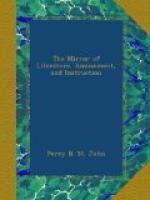In the article alluded to, the writer states, “It has been said that flowers placed in bed-rooms are not wholesome; that cannot,” he remarks, “be meant of such as are in a state of vegetation,” &c.
Now plants, it is well known, respire similarly to animals, through the pores of their leaves. By the agency of the sun, during the day, a quantity of pure gas, called oxygen, is given out; but on the contrary, during the night, or absence of the sun, gas of a most noxious and pernicious nature is emitted, and at the same time a portion of the pure air (oxygen gas) is absorbed. The greater part of the atmosphere must therefore be impregnated with this deleterious gas. Taking into consideration the confined state of a bed-chamber, the great increase of perspiration of the body, with the continual increase of carbonic gas from respiration, and this in an apartment where every thing ought most sedulously to be avoided which in the least tends to deteriorate the atmosphere, it must be evident the practice ought to be avoided, if we are desirous of preserving health.
Flowers in a state of vegetation are, I consider, more pernicious at night, or during the absence of the sun, than those plucked and put into water, provided they be not immersed too long a time; for immediately the stem is severed from the plant, the vital action, if it may be so termed, ceases, and decomposition commences; but till the decomposition has been going on some time, nothing of a pernicious nature need be apprehended. In like manner, directly the vital principle becomes extinct in animals, decomposition ensues. For the space of five or six days, however, no perceptible alteration of the fibres is visible; but after that time a compound of gases begins to exhale from the body, accompanied with a fetid odour, till the parts are entirely decomposed.
The effluvium arising from the farina and petals is considered unwholesome, however agreeable it may be to the senses, whether the plant be in a state of vegetation or not, it being too powerful for the olfactory nerve.
S.S.T.
Our pages are always open to the correction of our readers, and in this instance we thank S.S.T. for the above, although we think he has misconceived some portion of the article on “Flowers,” the writer adding to that passage quoted by our correspondent, “provided fresh air is frequently introduced”; of course, he does not refer to the night-time, although it would have been clearer, had he suggested the removal of flowers from bed-rooms during the night.—ED.




